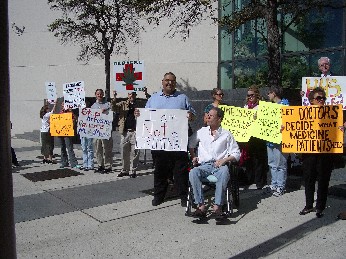Feature:
Medical
Marijuana
Supporters
Rally
in
DC,
Six
Other
Cities,
in
Effort
to
Force
HHS
to
Act
on
Rescheduling
Petitions
10/28/05
Led by the medical marijuana defense group Americans for Safe Access (ASA), hundreds of supporters of therapeutic cannabis rallied in front of federal Health and Human Services (HHS) in Washington, DC, and six regional HHS headquarters Wednesday to demand that the agency stop delaying its response to a petition to reschedule the plant. ASA also formally served notice to HHS Secretary Mike Leavitt that it intends to file a lawsuit over his refusal to act on a related matter, an appeal by ASA of an earlier HHS ruling that refused to apply the federal Data Quality Act, which requires that actions by federal agencies be made on the basis of sound science, to the question of whether marijuana has legitimate medical uses. Under the obscure act, federal agencies are required to make decisions on the basis of sound science.
Wednesday's rallies are part of a larger effort to overcome continued federal government recalcitrance on the medical marijuana issue. Despite the studies demonstrating marijuana's efficacy in treating various conditions, HHS continues to hold to its 2001 position that marijuana has "No currently accepted medical use in treatment," and thus should remain a Schedule I drug. And the Bush administration remains firmly opposed to medical marijuana, as witnessed by its energetic and successful opposition to the medical marijuana case decided by the Supreme Court in June. In that case, the court held that federal drug laws outweighed state laws okaying the use of medical marijuana. "Right now, there are at least 6,500 studies showing marijuana is a safe and viable medicine, safer than many drugs that are in Schedules II and III," said ASA field coordinator Rebecca Saltzman. "But as a Schedule I drug, American physicians and scientists can't even do research on it. They need to down-schedule it so our researchers can catch up with the research in other countries, and so it can be made available by prescription. Time is up. Patients are dying," Saltzman said. In addition to rallying at HHS headquarters in Washington, protestors gathered at regional headquarters in San Francisco, Denver, Seattle, Kansas City, Dallas, and Philadelphia, where they demanded regional administrators write letters to Secretary Leavitt urging him to act promptly. The demonstrations got some attention where it matters, organizers said. "The rallies were fabulous," said ASA campaign coordinator Karen Woodson. "We had more than 150 activists in San Francisco, including a bus load that came up from Southern California. In four cities, regional directors met with activists. Here in San Francisco, HHS regional director Calise Munoz and her legislative assistant met directly with us. She had a lot of our printed materials with her, she said she heard our message and that she would communicate it to Washington. By any measure, we consider this a very successful action." "Regional directors in Dallas, Kansas City, San Francisco, and Seattle met with activists because they had been getting so many phone calls and requests for meetings on the issue," said Saltzman. "I can confirm that in addition to San Francisco, the Dallas regional director will pass our strong message on to Secretary Leavitt. Those regional directors were getting so much pressure; their constituents are demanding answers." And they've been waiting for years. ASA was part of an ad hoc coalition that originally filed for rescheduling back in 2001. As that request moldered somewhere in the bowels of the federal bureaucracy, ASA filed the Data Quality Act petition last October as a back-stop. "After their earlier delays, HHS was supposed answer our Data Quality Act petition by September 26, but they didn't," explained Saltzman. "Wednesday, one month after the latest deadline, we delivered official notice of our intent to file a lawsuit forcing him to act to Secretary Leavitt. We had a bike messenger take it up to him, along with petitions bearing 20,000 signatures that request he act on our rescheduling request." There is no timeline within which Leavitt is forced to act on the rescheduling petition, Saltzman explained. "He said he would respond to it by August, but he hasn't, and he could let it sit for years if he wanted to," she said. "That's what prompted us to file the Data Quality Act petition a year ago." The government must act, San Francisco AIDS survivor John Shaw told the crowd there. "Michael Leavitt, your time is up. We presented the medical evidence almost four years ago to HHS, and we are still waiting for any response. People with AIDS throughout America cannot wait any longer -- we deserve an answer!" Leavitt has so far been extremely lethargic in responding to the issue. Maybe the urgings of his regional directors coupled with the threat of legal action will finally light a fire under him. If not, ASA and the medical marijuana patients will be back.
|

